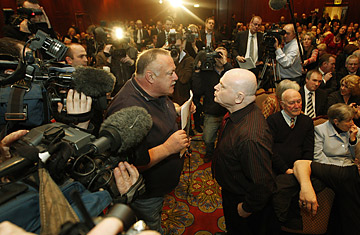
Rival factions argue during the launch of proposals from a Catholic-Protestant commission, to deal with the legacy of Northern Ireland's Troubles.
It didn't look much like peace. At the launch on Wednesday of a report on how post-conflict Northern Ireland should best deal with the legacy of its three decades of the Troubles, a Protestant woman, whose parents died in an IRA bomb attack 15 years ago, confronted Gerry Adams, the Sinn Fein President and best known face of Irish Republicanism. "Murderer!" she screamed, amid boos from some participants and cheers from others.
A vivid demonstration of how deep the rifts still run in Northern Irish society, the fiery gathering also showed how much has been achieved in the 10 years since political power was devolved back to Stormont. Victims and survivors from Catholic and Protestant communities mingled in a stuffy conference room at the Europa Hotel, itself targeted several times by terrorist bombers but these days better known as a venue for conferences and weddings. "We now need to take the next step", said Lord Robin Eames, the former Anglican Primate of All Ireland, and co-chair with former priest Denis Bradley of the independent Consultative Group on the Past (CGP). After 18 months of deliberations, the CGP was ready to unveil a range of proposals designed to acknowledge, and where possible alleviate the suffering of all parties in the conflict. (See pictures of the British army withdrawing from Ulster.)
Nestling among largely uncontroversial proposals — for an annual Day of Reflection, for example — was at least one idea that united old enemies, if only in outrage. A so-called "recognition payment" would see a sum of £12,000 given to all households who lost family members to the Troubles, whether the victim was civilian or military, Catholic or Protestant, the target of an explosion — or the person who died setting the bomb. "We are still fighting about who was right or righter, who had moral justification, and who had God on their side. And we are still terrified that if we acknowledge the grief and the moral position of others that it will dilute our own," said Eames.
Such a view has little traction for Hazlett Lynch, who stood silently at the back of the conference room, holding aloft a black-and-white photograph of his brother. Kenneth Lynch, a policeman, was 22 years old when he was shot in an IRA ambush in 1977. "I find these proposals totally repugnant", says Lynch. "How can they equate my brother's life with the people who killed him in cold blood?" He adds: "We want justice for what happened. We don't want to be bought off."
Pauline Fitzpatrick also lost a brother in 1977. He was a member of the IRA in Belfast, one of many poor teenagers who joined paramilitary groups at the height of the Troubles. Fitzpatrick's parents were unaware her brother had joined the IRA until he was killed by the British army. Today, Fitzpatrick is a family support worker who counsels mostly Catholic families whose relatives were killed by the police or by British security forces. "Obviously money doesn't solve all these people's problems", says Fitzpatrick after the public meeting. "But it's an important recognition that they have suffered as well."
There's little enthusiasm for the CGP proposals among the political classes. Peter Robinson, Northern Ireland's First Minister and leader of the Democratic Unionist Party, called the idea of the recognition payment "offensive." Nationalists and Republicans raised concerns that some recommendations could block future investigations into killings that may have involved collusion between security forces and paramilitaries. Such opinions will be registered, but may not prove decisive. Northern Ireland has come a long way, but ten years after devolution, the final judgment on the proposals lies with Westminster and Dublin.
See pictures of the British army withdrawing from Ulster.
